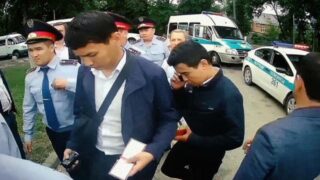The human rights activist announces he will remain in exile until a second prosecution will also be terminated.
by Laila Adilzhan


One of two criminal cases against human rights activist Serikzhan Bilash has been dropped in Kazakhstan. Bilash was forced to flee Kazakhstan under legal pressure and death threats, after he spoke out about the persecution of ethnic Kazakhs in Xinjiang. Bilash’s lawyer Shynkuat Baizhanov posted on Facebook a document from the Almaty City Department of Internal Affairs, which has decided to discontinue the case based on article 174 of Kazakh Criminal Law, which punishes those “Inciting social hatred.”
In fact, in 2020, two cases were initiated against Bilash, one under article 174 and one under article 389, which deals with the unlawful appropriation of property. The latter relates to the fact that the government consistently refused to register Bilash’ human rights organization, Atajurt, but allowed one Erbol Dauletbek to register another different pro-governmental organization with the same name. Dauletbek then complained that Bilash was illegally using the name and YouTube channel of Atajurt.
As for article 174, the letter, signed by the deputy chief of the Almaty police, Rustam Abdrakhmanov, states that the criminal case was terminated based on the results of a forensic expertise conducted in May 2020.
According to the lawyer Shynkuat Baizhanov, the case was initiated in the spring of last year, when Bilash used the phrase “waving a blue underwear” at a meeting, lampooning the title of a patriotic son, “Waving a Blue Flag,” a reference to the blue background of Kazakhstan’s flag. The song had been written by Almas Akhmetbek, himself an ethnic Kazakh who came from Xinjiang. The intent of the human rights activist was to criticize the author because he had testified against a Kazakh woman, Saltanat Kusman, who worked for her whole life in a Chinese company, then was accused by it, and, according to Bilash. convicted without evidence. Saltanat, who is a relative of the song’s author, had acted as a whistleblower, and had accused the Chinese company of evading taxes and financing a Chinese lobby in Kazakhstan. The company’s owner, a Chinese citizen, reacted by claiming that Saltanat had stolen corporate money—a false accusation, according to Bilash. The song’s author, who testified against Saltanat, had also received money from the Chinese company.
On January 19, 2020, Saltanat was sentenced to 8 years in jail. When Bilash attacked the author of the patriotic song, the prosecutor started a case against him based on article 174. An expert was asked to conduct a linguistic analysis of Bilash’s speech, and found nothing there intended to “incite social hatred.” After the case was dropped, the police who had handled the case were contacted by the media but refused to comment.
“The two criminal cases forced me to leave the country,” says Bilash, adding that he would return Kazakhstan “only when the criminal cases are terminated, and provided that they are not opened again.” But he said he would not stop spreading information about the situation in Xinjiang, no matter in which country he will be.
Bilash, who came to Kazakhstan from Xinjiang about 20 years ago, had been already charged in 2019 with “inciting social hatred,” and was released after a plea deal. The court banned him from leading a public organization for 7 years. After the verdict, Bilash said he was “forced” to reach an agreement with the prosecutor.
Bilash’s case has attracted widespread attention, both in Kazakhstan and internationally. Human rights activists have accused the Kazakhstan authorities of obstructing the work of those who denounce atrocities against ethnic Kazakhs in Xinjiang.
In November 2020, the United Nations Working Group on Arbitrary Detention reviewed Serikzhan Bilash’s case and ruled that he had been detained illegally. At least one million Uyghurs, Kazakhs, Kyrgyz, and other Turkic Muslims living in Xinjiang have been imprisoned in the transformation through education camps since 2017. Beijing has called these places “vocational schools,” but they are in fact jails. Human rights activists and witnesses have denounced there are serious human rights abuses in the camps, including torture, rape, harassment, violence, and forced labor.














